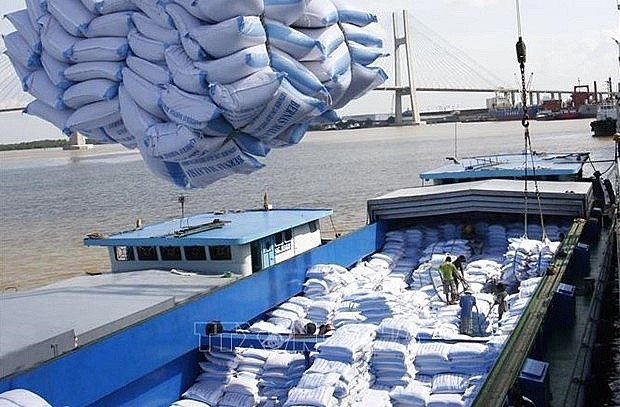Minister of Industry and Trade Nguyen Hong Dien said that Vietnam will continue its coordination with other nations involved in the wide-reaching agreement (CPTPP) to soon round off negotiations on the UK’s accession to the trade deal.
 |
| Kinks to iron out to prepare for British involvement in trans-pacific agreement, illustration photo/ Source: VNA |
“Vietnam reaffirms its strong support for the UK to join the CPTPP which, in addition to the positive impacts of the UK-Vietnam Free Trade Agreement (UKVFTA), will help both nations to further increase their trade and investment ties. The UK’s participation in the deal will also bring about wonderful trade opportunities for each member,” Dien said.
The CPTPP, established in 2018, includes Australia, Brunei, Canada, Chile, Japan, Malaysia, Mexico, New Zealand, Peru, Singapore, and Vietnam. Brunei is the sole member yet to see the agreement come into force. The trade area represents 13.5 per cent of the global economy, a total of $10 trillion and 15 per cent of global trade revenue, equal to $5 trillion.
The UK is on the cusp of joining the CPTPP, long held out as a key post-Brexit prize. Within a few weeks, two visits have been paid by British officials to Vietnam, working on boosting the upcoming accession.
“As a major economy and strong advocate of free trade, our membership will support the trade bloc to shape the high standards of global trade – particularly in the face of increased protectionism,” said UK trade minister Greg Hands when he visited Vietnam on February 1. “Joining the agreement will add even more economic clout to this exciting and dynamic trade alliance, helping it grow to £11 trillion (nearly $14 billion) or from 12 to 15 per cent of global GDP.”
The UK believes that its membership will add another like-minded partner and strong voice to this powerful alliance. It will give British businesses tariff-free access to over 99 per cent of goods to a market of around 500 million customers.
“We hope that Vietnam would continue helping the UK call on other countries to complete negotiations,” added Mark Garnier, the UK’s trade envoy for Vietnam, Thailand, Myanmar, and Brunei at a meeting with Minister Dien on March 13 in Hanoi.
However, according to an updated report for March from the UK Parliament, the road for the UK to reach CPTPP membership may contain a few more bumps.
“The government had hoped that negotiations could be concluded by the end of 2022. However, as the UK is the first country to seek to join the CPTPP after establishment, it is difficult to make predictions about how the accession process will operate in practice,” said the report. “Existing members may want to ensure that the process is rigorous, especially as other countries are interested in joining.”
In 2021, China and Taiwan applied to join, while Ecuador applied a few months later and South Korea also announced that it would begin the application process to join. Other markets have also expressed interest, including Indonesia, Thailand, the Philippines, and Colombia.
In November 2021, the British International Agreements Committee published a report on the UK’s negotiating objectives. The committee found that while the objectives provided some information about what it hoped to achieve, they were lacking in detail. The report raised concerns in a number of areas, including intellectual property and food standards.
The UK Parliament report also cited some commentators as having observed that agricultural standards, digital trade, and investment protection provisions may be issues in the negotiations.
Meanwhile, there have also been differences in approaching benefits from the deal, so the negotiations may take longer. For example, foreign media said Canada’s demand that Britain opens up its beef market thwarted hopes of a breakthrough during talks earlier this month. Canada is now also negotiating a bilateral trade deal with the UK at the same time as London vies to join the bloc.
Along with Mexico, Canada is pushing for the UK to offer the same market access it granted on agriculture as it did in pacts with Australia and New Zealand. In those deals, which have proven controversial among British farmers who fear the impact on their livelihoods, the UK agreed to drop tariffs on beef and sheep meat imports over 10-15 years.
Currently, the Vietnam-UK trade and investment ties are largely driven by the UKVFTA which took effect in May 2021, in addition to the Southeast Asian economy’s improved investment and business climate.
As part of the UKVFTA, 85.6 per cent of tariff lines for goods imported by the UK from Vietnam were eliminated in January 2021, and 99.2 per cent will be removed by 2027, according to the UK’s Department for International Trade.
UK-Vietnam trade continues to grow: bilateral trade reached nearly £6.4 billion (nearly $7.8 billion) in 2022, up by over 20 per cent on-year, and Garnier is confident this relationship will continue to strengthen.
“This is a hugely significant year as we mark 50 years of diplomatic ties between our two countries. I am delighted to reaffirm the UK’s commitment to bolstering our trade and strategic relationship with Vietnam, and to building new commercial partnerships across key sectors,” he said.
Vietnam’s Ministry of Planning and Investment reported that accumulatively as of February 20, the UK’s total registered investment capital in Vietnam was $4.25 billion for 511 valid projects, including $1.2 million for the January-February period.
Source: VIR